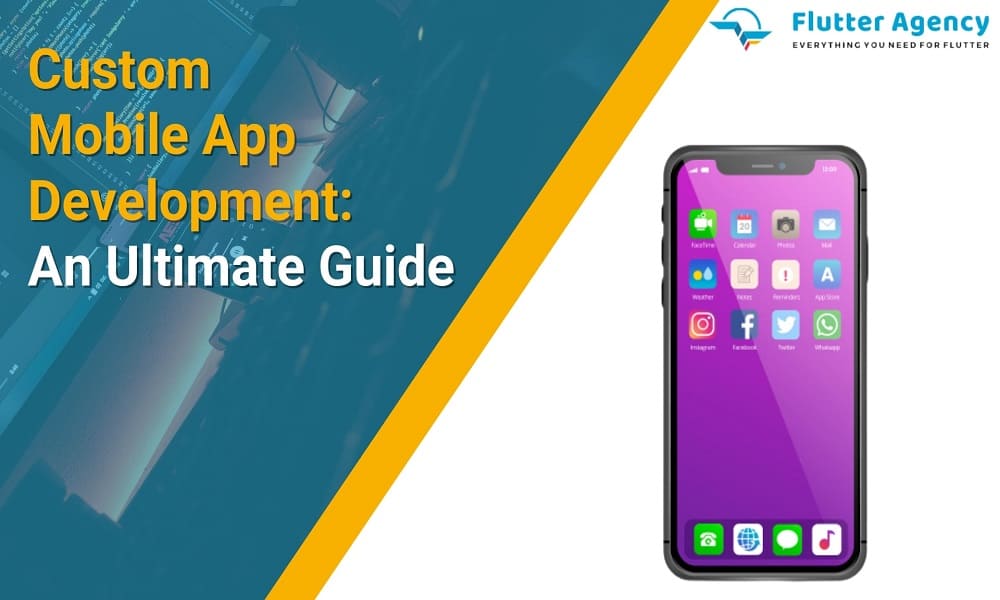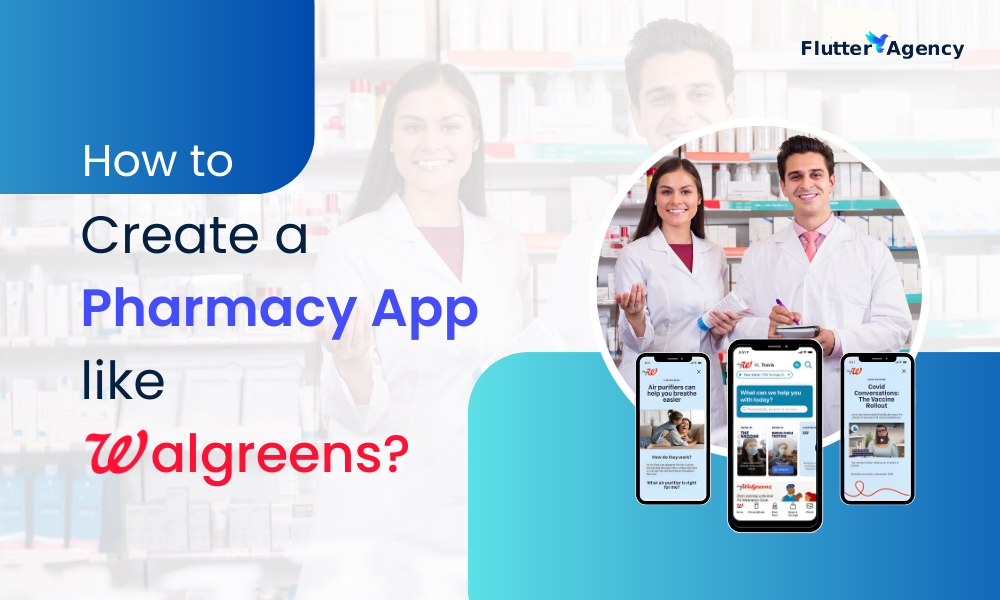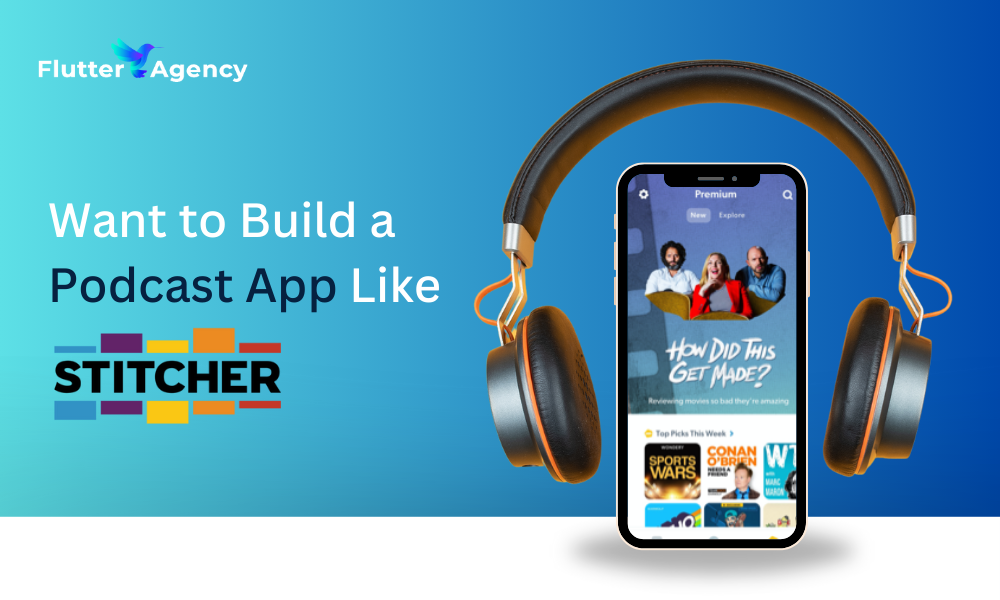Custom Mobile App Development: An Ultimate Guide
A number of the apps downloaded to Google Play and Apple stores have reached millions this year. As many apps are available in the market, it becomes very challenging to differentiate your product or service from competitors. Hence, companies of all firms and sizes must invest in custom app development to get consumers’ attention and stand out from competitors.
Is it possible to succeed with custom app development? This article will discuss all the peculiarities of custom development: app type, cost, development stages, and benefits. Let’s dive into the deep of custom app development.
Introduction: Custom Mobile App Development
Custom mobile application development is the same as web services as it focuses on delivering the best options for an existing OS and mobile devices. A custom mobile app development solution needs to ensure that:
- It must be available on all the latest tablets, mobile phones, and wearable devices.
- It can adapt to any screen sizes.
- Compatible with well-known operating systems.
- It will adapt to future OSs, screen sizes, and modules.
Reasons to Develop Custom App
According to research, the app development software market is expected to reach around $1,039.89 billion by 2027. If you are running a business and want to create an app, then the below statistics will give you an idea about investment in custom mobile app development.
Let’s see the research of Statista and leftronic.com below:
- More than 5.13 billion mobile phone users are available globally.
- The number of apps downloaded is projected to reach around 15.2 billion in 2023.
- Mobile applications are expected to generate $935 billion in revenue by 2023.
- 90% of the time is spent on mobile phones by people
- On average, every user has 11-20 apps installed on their smart gadgets.
- Approximately 60,000 new mobile apps are released monthly via the Google Play Store, and about 25,000 are in the Apple App Store.
These figures will encourage brands to advance in mobile app development. Adapting the custom solution will aid organizations of all sizes and domains to address their exclusive needs, solve particular business issues, and make their workflow quicker and more efficient by delivering a unique customer experience.
Benefits of Custom Mobile App Development
Nowadays, businesses of all kinds, whether small, medium or large, are taking advantage of customized apps and helping them stay competitive and increase productivity. Here are some of the leading benefits of custom mobile app development for your business, which are described below:
1. Better Efficiency
A company can deliver excellent efficiency in business when its employees do well. It happens because of effective management and communication between the company’s stakeholders and employees.
Many leading app development companies communicate and engage with their employees at the workplace, as they need to produce better efficiency in business operations.
It usually happens because there is a need for a similar platform or app which connects all the people in a single place and will give them all the necessary features they require. Due to this, the company opted for custom mobile app development.
Rather than utilizing various apps for multiple business activities, a company develops a custom mobile application with features that meet all the project requirements. It will not only increase your communication speed but also boost business efficiency.
2. Boosts Productivity
Efficiency is achieved when it produces excellent productivity. Productivity is improved when your enterprise can easily access the tools, resources, and knowledge utilized effectively. Many mobile application development processes help businesses to enhance their productivity.
Every business has different requirements. Searching for the best mobile apps which will aid you in improving productivity is a challenging task. Hence, it would be best if you went for the custom mobile app, which is specially built as per the business operations and employee engagement model.
You can even build a tailored app that allows you to gather and exchange all the data in real time and offer powerful tools to your employees to improve their performance.
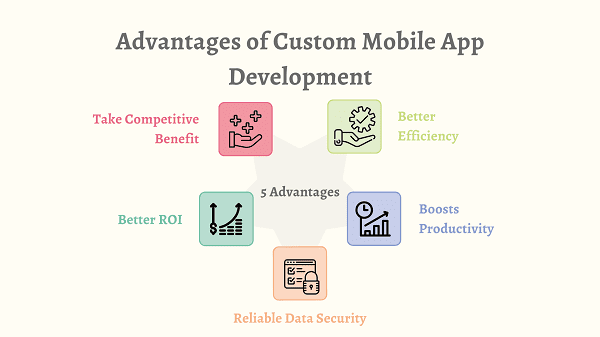
3. Reliable Data Security
Data security is a significant concern for every company. However, the security of mobile apps is getting more complicated these days. You can not rely on standard or conventional security features. As you know, the app saves the sensitive and critical data of your users and your organization, as you don’t like them to put it at risk.
In the top leading apps, sometimes the data could be recovered, which leads to a significant loss in the brand reputation and the financial.
And in this, custom mobile app development comes into the app market. It gives you complete freedom to implement any of the technologies you wish. You can select any databases, cloud storage, servers, and technologies per your budget and business requirements.
4. Better ROI
Many app owners first consider how much the cost of app development is and whether the app will give them sufficient ROI.
However, most of the apps are made on well-known or conventional revenue models, which take the standard time to generate revenue. However, custom app development is built by keeping your business needs in mind, and it delivers effective revenue options for your app. When your app is tailored for specific business needs and user issues, it will give you more significant ROI.
5. Take Competitive Benefit
It is a vital advantage of custom mobile app development. Many businesses focus on creating trending types of mobile apps as they try to avoid the risk of developing customized or tailored apps due to the threat of whether the audience will like the app.
Hence, the custom app is made to help the users and give them unique features which are rarely found in apps, and your mobile app can take the competitive benefit in the market. Amazingly, it helps you stand out in the competition and set your application different from other apps.
Difference Between the Custom and Conventional App Development
Custom and conventional app development booths are quite the same as both concentrates on developing applications with a narrow set of requirements depending on the particular needs of the given group of users. But there are some differences in its functionalities. Let’s see some of the factors below which distinguish them:
- Custom app development is not IT-team-centric; it completely controls business users creating the application. With the help of conventional app development, users have to communicate the needs of the business to an IT team developing them.
- Custom development also keeps the end users involved and uses the platform which encourages its users to use their services. And they don’t need the heavy coding. Whereas conventional app development is not only restricted to no-code development as the IT team is also involved in creating the applications.
- Custom app development is speedier as it has a shift in control. In comparison to that, conventional development is a slower procedure because the request has to go through an IT team, which is often a bottleneck.
- Custom app development is easier to configure and customize as it utilizes low-code development apps. Conventional apps need external specialists or developers with the expertise to customize features and make systematic changes.
Types of Custom Applications
As an entrepreneur, you must consider the various factors to create a powerful and cost-effective mobile solution. So let’s see some of the custom application states below:
1. Native Application
Native development means an app is designed for a particular device platform, either Android or iOS. The choice between both platforms is usually affected by your targeted audience.
Native mobile platforms are fast, easy to navigate, and tend to streamline the user experience. A neat and clean design will assist the users in making the most of their knowledge, while sustainable architecture ultimately enables them to benefit from an app’s features. A whole set of native built-in features that consist of the GPS and access to the device’s camera and movement detector is a fantastic benefit of native development.
Also, Read This Post:
Hybrid App V/S Native Apps: A Guide To Mobile App Development
2. Hybrid Application
A hybrid app is created with the help of web technologies such as JavaScript, HTML, and CSS, which are merged. Technically, hybrid apps are a combination of both native and website solutions. They will do the work similar to websites but run from within the native app and its embedded browser. However, the hybrid apps will use cross-platform capabilities and are created on one code base to cover the various platforms, contrary to native mobile solutions.
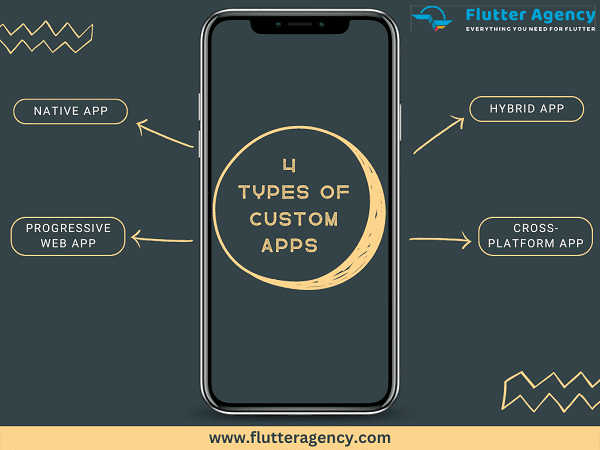
3. Cross-Platform Application
Cross-platform apps are created to operate on distinct platforms. It is a good approach for businesses that build custom apps that are not entirely dependent on native functionality. It will speed up launch-to market, cut down development time, and make apps easier to maintain and update.
Cross-platform solutions will help to accelerate custom mobile app development and deduct the cost by 30%. The primary thing is that native mobile app development time is estimated for both platforms. At the same time, a Flutter framework will enable software developers to develop only one codebase for iOS and Android.
4. Progressive Web App
You can also develop the Progressive Web App (PWA) in Flutter , which will give the website a browsing experience closer to native apps and make it more user-friendly.
PWAs use modern web APIs, enabling them to give a native-like experience. It runs features like push notifications, hardware access, offline access, and home screen icons. Progressive web apps are also a fantastic choice to target users with older devices and unstable internet connections, as it load speedier and do not need installation.
Also, Read This Post:
Flutter vs. Kotlin:Which framework to select for your next development project
Industries Making Use Of Custom Mobile App Development
Here are the well-known sectors which are getting benefited by the use of digital solutions.
1. HealthTech
The telemedicine development objective is to deliver seamless healthcare services to users worldwide. For instance, it allows people to track their physical conditions, book appointments, and get drug prescriptions online.
2. Social Networks
Businesses should have a social presence to raise brand recognition and reach a wider audience. However, with a growing number of active social media users, it is profitable to create social networking.
3. Travel
Travel planning applications assist travelers in planning their trips. As in the apps, they can book tickets, reserve a hotel room, check the well-known locations of that area, and many more.
4. Retail
Many people prefer to shop online. Due to this, an e-commerce mobile app development and platform enables retailers to promote their brands and products worldwide.
5. Fintech
Due to its usability, customers migrate to payment apps from cards and cash. Advanced and modern financial software automates invoicing, cash-flow management, the process of online payments, and so on.

Steps to Create Custom App Development
However, custom app development is an innovative idea, but it is still dependent on similar methodologies as the other forms of app development that are also available. Here are some states involved in creating and deploying the custom app from scratch:
Step 1:Identify Problem and End-user
Every app is built to fix errors for a specific set of end-users. Understanding the problem and part of the application will play a significant role in the development phase and is the crucial step for the end user.
Step 2: Create a Prototype
In this, you have to visualize the workflow. what it will look like, what core features it will need, and determine the necessary information to fulfil the application requests.
Step 3: Develop an Application
Custom application development is usually created on low-code or no-code platforms. It is an essential step which relies on the expertise of the business user since they know intimately how each request will flow, what is required and how to resolve it.
Step 4: Simulate
The most vital phase in app development is the testing process. This procedure will highlight any possible issues in the application that highlight its errors or steps that need to change.
Step 5: Go-live
It is the gratifying phase of custom app development. However, going live with the mobile app means pushing an app to the live environment where the users get involved, raise their racquets and fulfill them. Hence, the apps need to be monitored quickly to see no bugs or errors that have slipped through the cracks.
Step 6: Optimization
The process of custom app development continues after that. The final stage will involve measuring the crucial metrics and keeping track of performance to give its app users optimal performance and output.
Conclusion
Custom mobile app development providers like Flutter Agency emphasize meeting business needs and demands. Therefore, you must describe your objectives and expectations clearly to auditors.
In addition, we provide a revolutionary mobile app development platform, which will create a custom technology solution ten times faster than traditional app development methods. An automated platform features, pre-configured business-specific modules; preconnected technology components which are bug-free and do not require testing, and many more. Hence, it is configurable at the business level based on the organizational structure. It will shorten the time-to-market but keep the solutions affordable and reliable.
Nowadays, businesses benefit from custom mobile application development to stay ahead of the competition. If you have yet to think about it, now, it is the perfect time to access it.
Frequently Asked Questions (FAQs)
1. What is the primary purpose of application development?
A mobile application is the kind of app software designed to run on a mobile device like a smartphone or tablet computer. Mobile apps are frequently served to provide users the same services as those accessible on PCs.
2. How is custom app development better than low code development?
Creating the software will use a low-code development approach, is limited, and will not achieve the complexity of the many apps. On the other side, making a custom app permits businesses to use comprehensive software frameworks and customize the solutions to different problems or requirements.
3. What are the benefits of having custom coding?
It will give complete control over the fetched data because some SQL queries are very complicated to replicate in views. Hence, some opportunities for query optimization might exist while writing custom code.
4. How will applications make money?
Free apps are monetized via various means, which include in-app purchasing, affiliate marketing, sponsorship, and advertising.
Contemporary ventures
Recent blog
ready to get started?
Fill out the form below and we will be in touch soon!
"*" indicates required fields

